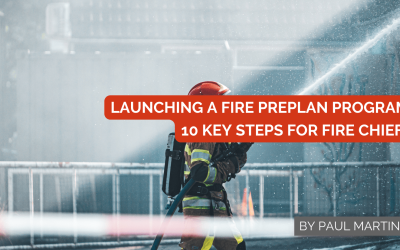Prepare first responders with a pre-plan and smart mobile devices
It’s the twenty-first century, and we’re connected through technology more than ever before. Unfortunately, that can’t be said of those who risk their lives every day to do their job.
Ask yourself: Are your first responders leveraging smart and mobile technologies like iPads and iPhones to implement effective pre-plans immediately? Or are they still relying on paper records stored in your filing cabinet?
They shouldn’t be relying on paper, because first responders—firefighters, law enforcement, and emergency medical services personnel—are facing ever-greater risks from increasingly dangerous operations for two reasons: the proliferation of hazardous materials, and modern construction materials. That’s why they need to use every weapon at their disposal. With the advent of mobile-first technology, have the data sources that your first responders rely on kept pace? Do they know if there are hazardous materials at an incident site, and do they know what they are? The potential for a hazardous-material incident exists in almost every setting, and health hazards can result from a single exposure, in just a few seconds.
The structure of modern buildings also poses an increased risk for first responders. Today, in the construction industry, there is a push to reduce carbon outputs to meet green targets. Therefore, developers are turning to alternative construction methods to cut costs. Unfortunately, this has led to the use of modern construction materials and furnishings that are more combustible than traditional materials. For instance, today’s buildings are built with engineered beams and wood, which are just small pieces of wood compressed together with glue—more combustible than solid wood—resulting in a greater and faster degree of fire spread.
Whether your first responders are exposed to combustion by-products of modern construction materials such as carbon monoxide and cyanide, or hazardous materials such as liquefied hydrogen and bulk oxygen, they are facing extremely dangerous operations. And, for the most part, they’re facing them unprepared, with paper—not a pre-plan and smart mobile device—in hand.
You’re expected to ensure the safety of your personnel with data that currently resides in filing cabinets. In today’s world, with its continuous connectivity and mobility, people communicate and collaborate in unprecedented ways, and so should your first responders.
A pre-incident plan would give them necessary and sufficient information about a building so that they can prepare and execute their response plans. Relying on paper records stored in a filing cabinet, or on an archaic desktop-based record management system, is simply not enough. It’s essential your first responders have pre-plans available at the time the emergency incident is reported—that is, before, and not during or after, an emergency operation.
Your first responders need fully integrated, mobile-first technology with the right data that enables them to easily and intuitively create and implement effective pre-plans. Furthermore, smart mobile devices give first responders a wide variety of ways of accessing building information and rapid access to all building records. They can share critical data with team members by sending a temporary link via email or mobile text message—invaluable for interagency interoperability during an emergency operation.
With mobile-first technology, your first responders will have critical building construction data. They will be prepared for any kind of structural failure inherent in a building’s construction materials. For instance, they can predict collapse tendencies and patterns, determine fire severity from smoke factors, and judge how best to ventilate the structure. They’ll also have access to information on hazardous materials. Access to such data will enable your first responders to begin strategizing their response the minute an emergency incident is reported.
Bring your first responders into the twenty-first century—ensure they are prepared with a pre-plan and smart mobile devices in hand.


